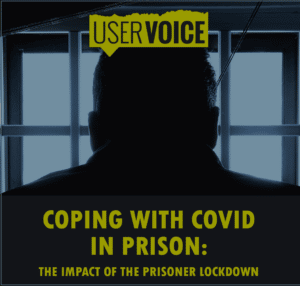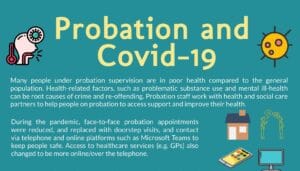Extreme restrictions
Today, User Voice has published a new report on what it’s like to be in prison or on probation during lockdown. The organisation listened to the vies of 747 people in 14 prisons and 1,450 people on probation in 13 areas between April and July this year.
"It's a frustrating time for me as the 23 hours lock up has stressed my mental health. I suffer from PTSD and sometimes have vivid flashbacks of past incidents. Earlier this week, I was taken on an "act" as I was having suicidal thoughts. Since then my medication has been re-stabilised and I feel much better. I haven’t been able to implement my coping mechanisms as I have no access to education, employment or general time out of my cell which allows me to have some form of normality."
Male Prisoner- Developer
Key issues in prison
The report highlights a number of key issues including communication, physical and mental health, regimes and visits.
Communication
Communication was a common theme with a lack of consistent information. For instance, prisoners at one prison were surveyed about what resources they wanted to see opened up first – education, gym, etc. – but then weren’t told what was decided as a result.
Mental health
A quarter of people contacting User Voice during lockdown reported trying to access mental health support and struggling to survive without any face-to-face support.
Physical health
A number of people told User Voice they were not receiving the right medication. This ranged from individuals entering prison who were not permitted the medication they take in the community; prisoners returning from hospital appointments refused the medication prescribed by the hospital doctor; and prisoners who had injured themselves and were not prescribed adequate painkillers.
Regime
In addition to the difficulties of coping with such a heavily restricted regime, many people highlighted the poor state of facilities including cells, but also prison wings, showers and recreational facilities. Some reported that little if any routine maintenance is taking place, with the result that cell conditions are deteriorating, and that prisoners do not have access to cleaning products.
Visits
While prisoners understood why social visits have not been permitted, they spoke of how they were struggling not seeing family and friends for such an extended period of time, making any mental health issues worse.
Now that social visits are starting again in some places. Many people are concerned that they still won’t be able to see their children due to long journeys and shorter visiting times or additional complications such as children who are living in separate households not being able to come together.
There was frustration about the lack of video visits and the speed that they are being rolled out across the prison estate. Given the complications for some when it comes to social visits and the likelihood of changes to restrictions in the community, video visits will remain essential in the coming months.
Positives
Some people in prison provided positive feedback:
- The fact that call rates had been reduced and prisoners were being provided with an additional £5 phone credit was helping them to remain in touch with their friends and family.
- In some prisons, prisoners told us they were happy to be getting to shower and exercise.
- Where changes had been made, prisoners welcomed the extra TV channels and in-cell activity packs to alleviate the boredom.
- In two prisons, we were told that Listeners (prisoners providing mental health peer support to other prisoners) were still active which was crucial to them.
- And one prisoner in isolation for Covid-19 raised that staff were bringing them regular food and medication and giving them regular health checks.
Recommendations
People in prison suggested:
- Providing them with strategies of how to cope with lockdown
- Providing updates and clear criteria on the early release policy
- Appropriate prisoners could go door to door to explain to non-English- speaking residents what is happening
- Producing a leaflet about the regime to go under cell doors
- That basic prison jobs (cleaner, servery and laundry) could be rotated to give everyone time out of their cells
- Trying to ensure that as many healthy fresh and BAME items as possible are available on the canteen
- They have access to cleaning products to maintain the cleanliness of their own cells
- Increased visits at their cell door to check prisoner’s mental health and welfare
- Staggering release of medication to ensure social distancing
- That key workers should visit residents at their door to maintain the relationship and provide information and support
- Changing the films being shown more regularly
- Being allowed nail polish, scents or other personal grooming items
Key issues on probation
User Voice’s main findings from the people they spoke to who were on probation were:
- 33% of people on probation said they had stopped receiving one or more support services as a result of the Covid-19 restrictions. The main ones being mental health, substance misuse, foodbank and housing support.
- For people trying to get mental health and substance misuse support, they are struggling without face to face contact and many don’t have WIFI and cannot afford data needed to access the services that have now gone online.
- Many people aren’t being updated on changes to probation and communication was the main issue for them. This includes minimal contact from their probation officer, difficulties reaching their probation officer and a lack of clarity about what programmes or courses they should be attending as part of their sentence. By contrast, 25% people on probation said phone and text contact from their probation officer was good.
- People also highlighted issues around the relationship with their probation officer. People who had little contact felt they were not a priority and short calls made them feel a burden, that there was a lack of support and they were on their own.
- For people required to do unpaid work (community service) they had received little information on when it would restart, the impact on the number of hours they had to complete and if the original time frames for completion remained.
- Suggestions from the User Voice council included a regular letter posted to everyone with general information and greater use of text messages to communicate.









